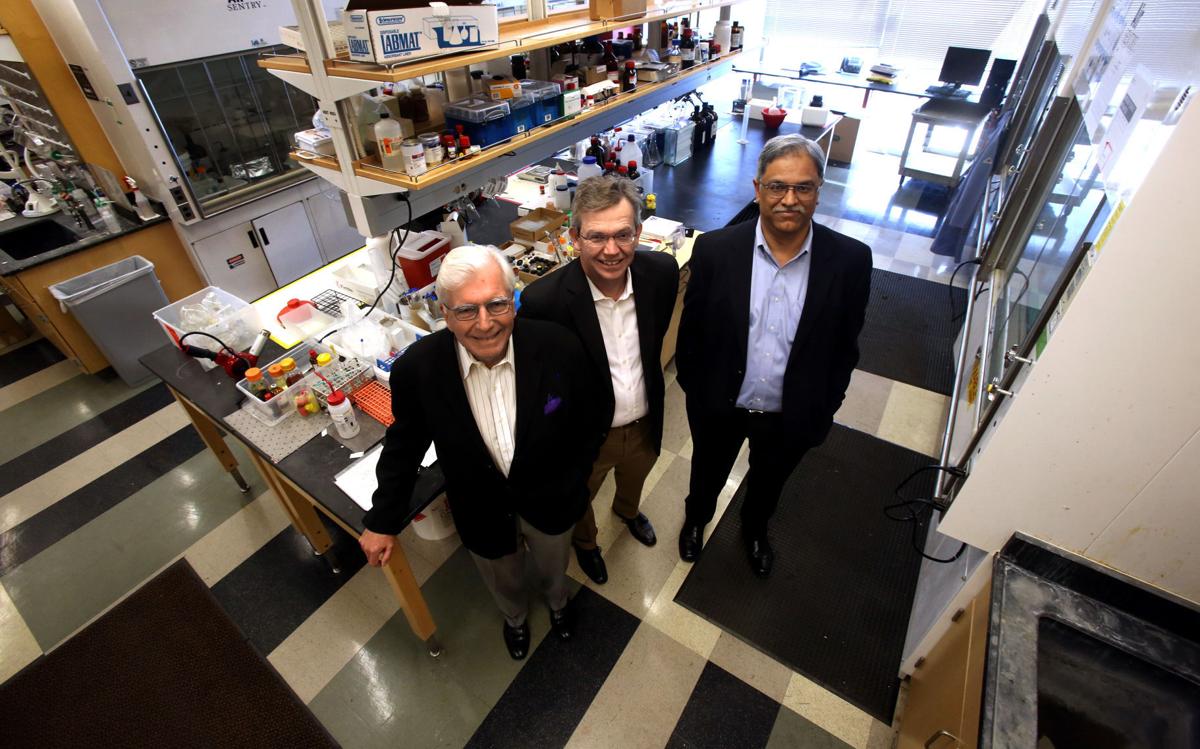Though Tucson-based Reglagene LLC is just an infant of a biotech company, it’s already crawling forward with its technology to selectively turn genes on and off to combat cancer.
The company was formed in November based on the technology developed by co-founder and University of Arizona drug-discovery chief Laurence Hurley.
Hurley and his Reglagene colleagues rushed to file an application for the 2017 Flinn Foundation Bioscience Entrepreneurship Program just in time to meet a Nov. 6 deadline, said Richard Austin, Reglagene’s CEO.
It was worth the scramble, as Reglagene was recently named one of seven Arizona bioscience startups — and the only Tucson-area firm — to win the Flinn competition and $30,000 in funding support plus program services.
Since 2014, the Flinn Foundation has allocated $645,000 in grants to Arizona nonprofits to provide funding and services to 22 early stage bioscience firms.
“The Flinn win is really important for us,” said Austin, who for five years ran operations at the former Sanofi drug-research center in Oro Valley. “The money is nice, but it’s really put Reglagene on the map as an Arizona startup.”
Hurley, the company’s chief scientific officer, already is on the map as a serial biotech entrepreneur, having founded two companies that were later acquired for their technology.
Another Reglagene co-founder, Vijay Gokhale, has worked with Hurley for more than a decade on gene-based drug discovery and is head of computational chemistry at the UA’s Bio5 Institute, where Hurley directs drug discovery.
The company’s core “DNA quadraplex master switch” technology is used to identify small molecules that can act to switch certain genes on and off, with the aim of killing cancer cells.
“Its like a knot in DNA, and in order to turn on or off genes, you have to either tie up the knots or undo it,” said Hurley, who pioneered the method nearly 20 years ago. “We have drugs that can act like the real proteins in the cell to turn it on or turn it off. We have the capacity to turn off cancer genes. We also have the capacity to turn on genes, which is also important for other diseases.”
Hurley said many other researchers worldwide are working to advance the original technology, which was acquired by San Diego-based Cylene Pharmaceuticals and taken through mid-phase clinical trials before the company dropped it.
Hurley founded a new company that reacquired the technology in 2013, but with Reglagene, he and his colleagues are working on second-generation DNA-quadraplex technology.
“There’s a lot of people doing this in Asia, in Europe, in the States, but I think we’re quite a few years ahead of the game,” Hurley said.
The latest generation not only enables turning genes on and off, but allows the rate of change to be adjusted, which could be even more useful, Hurley said.
“Now, instead of having an on-off switch, we can do dimmer switches,” he said.
Austin, who was senior planning and resources manager at Sanofi before the Oro Valley operation was acquired by Icagen last year, got involved with the Reglagene while working as a “commercialization partner” with Tech Launch Arizona, the UA’s technology-transfer arm.
He said the company will remain initially focused on cancer and plans to go after government grants as seed funding.
Austin said Reglagene has strong support from Tech Launch Arizona, including the counsel of mentor-in-residence Mike Sember, a former drug company executive.
Ultimately, Austin said, the founders see Reglagene as a drug-discovery company, serving major pharmaceutical companies that increasingly are relying on smaller firms to do such work.
“The pharma industry is really getting out of the drug-discovery business,” he said.
BIO ROADMAP
Movers and shakers in Southern Arizona’s bioscience industries gathered in Tucson Wednesday for an annual luncheon celebrating the Arizona Biosciences Roadmap, an effort launched in 2002 by the nonprofit Flinn Foundation in Phoenix to grow the state’s bio industry.
There were no new numbers — the bio industry stats are updated every two years and this is an off year — but speakers at the event at Loews Ventana Canyon Resort cited continued growth and challenges to the industry.
The kenote speaker was Phil Wickham, a UA alumnus, veteran Bay area venture capitalist and startup entrepreneur.
While raising capital remains a major challenge for Arizona biotech entrepreneurs, Wickham said Southern Arizona is on the right track in collaborating with the UA and drawing talent and mentorship from local companies.
“Build great companies and capital will find them,” said Wickham, former CEO and current executive chairman of Kauffman Fellows, a nonprofit group based in Palo Alto, California, that offers a leadership development program for venture capitalists.
Raising capital “starts with branding and storytelling,” he said, adding that well-run business incubators can help add value to startup efforts.





